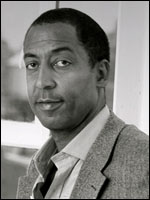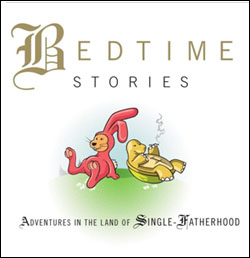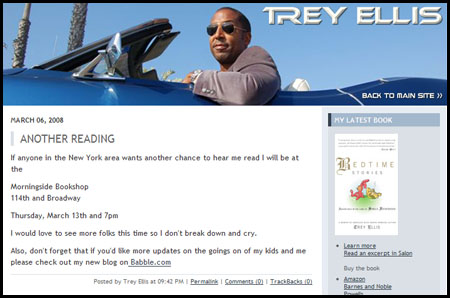Novelist, Screenwriter, Political and Cultural Critic, Trey Ellis

Trey Ellis has been a professional novelist, screenwriter and essayist for fifteen years. He is considered one of the most astute authorities on the black middle class, domestic race-relations and pop-culture in the United States and is often requested to contribute on these issues at home and abroad. He has been interviewed on The CBS Early Show with Harry Smith, KCRW's acclaimed "Which Way L.A.?" and "The Treatment" with former New York Times film critic Elvis Mitchell as well as for the E! True Hollywood Story. He has contributed to such notable newspapers and magazines as The New York Times, Newsweek, Playboy, The Village Voice, The Washington Post Book World, The Los Angeles Times and Salon.com. He was recently commissioned to write his first play, for the Lincoln Center Institute. He is a regular blogger on Arianna Huffington's popular political website HuffingtonPost.com.
Trey Ellis seems as complex as his life seems complicated; as serious as his life seems fun (and funny). Trey generously offers a welcome opportunity to escape by inviting us to wallow in the unadulterated humanity of a single Dad in the big city.
DR: Tell me about your life and your work.
TE: I am a writer. I write novels and movies and I am a political blogger on the Huffington Post. I am also teaching screenwriting at Columbia University film school. Last year I wrote my first play which was put up at the Lincoln Center Institute which is Lincoln Center's teaching wing.
I like doing a lot of things. I like wearing a lot of hats.
DR: Your book is about fatherhood. Can you tell me about being a father, doing the work that you do, living in the city...
TE: Five years ago, my wife and I divorced after being together for twelve years, and I was left to principally raise my three year old daughter and my eight month old son. My new book Bedtime Stories is about that journey; the journey that begins with my wife moving out - it was her idea - to sort of rebounding and trying to find love again in Los Angeles, and then giving up on Los Angeles altogether and moving back here to Manhattan.
DR: So, what do you find most challenging about balancing single parenthood, career and city life?
TE: Single parenting is challenging just because you don't really have a break. Every time I want to do something I have to organize that with a baby sitter. That's tricky.
It's the three of us most of the time. We do a lot together and when I want to do something separate like, even just go to the gym, I have to really, really budget every single moment of my time. Today is a good example where I am doing about six different things and maybe about 45 minutes of the whole day will be unstructured.
DR: Don't you just hate that?
TE: Well, you can't really hate it because it's just the way my life is right now and I like my life a lot. I like that it is exciting but I do long for a little more freedom sometimes.
DR: Do you have a particular philosophy or point of view that guides your life?
TE: I am a Zen Buddhist so I try to meditate. I used to sit and meditate everyday. Since the kids were born I don't sit and meditate as much as I used to. But just recently, with all of the stress in my life, I decided that I have to carve out that time. I try if I remember, after I take the kids to school, to come back home and meditate for a half hour. It helps me a lot.
There is a self help book that my ex-wife was really into called Don't Sweat the Small Stuff (It's All Small Stuff). I have been trying to teach that to my son, especially recently, because he has been having these tweaking freak outs about the littlest things (he's only six years old) and he kind of reminds me not to freak out about things.
If you look at the things right now that seem like a huge problem, they weigh you down. But then if you were to look back a month later or a year later, you probably won't even remember what those problems were, or if you do remember them, there's not a real charge to them. So, if you can remember that in the moment, they're not going to bite you as much.
Everything is fleeting.
BEDTIME STORIES: ADVENTURES IN THE LAND OF SINGLE-FATHERHOOD

"Ellis relates his story of heartbreak and child-rearing with candor, comedy and self-awareness, making this emotionally turbulent ride instantly and tirelessly engaging....Ellis and his memoir deserve a place among pop culture's most beloved Mr. Moms." —Publishers Weekly (starred review).
“A moving, funny, down-to-earth, sexy and delightful account of a uniquely caring, passionate and eloquent father's journey into and through single fatherhood — a great gift for anyone who values the true dramas of committed parenting.”
— Naomi WolfI have been working on Bedtime Stories for over three years now but even several years earlier I had been itching to start a memoir. Reading Dave Eggers's A Heartbreaking Work of Staggering Genius inspired me to finally dive in. I loved the idea of writing a funny, experimental novel about myself and the difficulties I've encountered. In so many romans a clefs the author tweaks the facts and his or her own personality traits to make themselves seem either more heroic or more anti-heroic than they really are. The James Frey debacle is a perfect example of the anti-heroic. I was determined to capture the unvarnished truth so I included events that evoke pity: my parents' early deaths, my wife leaving me to raise our then three-year-old girl and eight-month-old boy, as well as revulsion: internet porn and Brazilian hookers, as well as envy: beautiful French actresses, models, and an Italian countess. As you will see in the book, the reason it took so long to finish was that I was living a life in search of an ending. By the end I was tempted to rob a bank or run naked and screaming into a mental hospital to give the memoir a big finish. Instead, I learned some amazing lessons about myself. At forty-four, I finally grew up.
Click here to learn more and to buy Bedtime Stories
DR: What would you consider to be a good problem; a problem worth having?
TE: I look at everything as a lesson.
I think that the suicide of my mother and my dad dying of AIDS, there were tragedies in my life but I learned from them. Once things happen to you, you have to accept them and learn from them no mater what.
DR: Will you share with me a valuable lesson that you learned from a personal tragedy?
TE: With great personal tragedy you learn how strong you are. The Nietzsche phrase that's used so much "What doesn't kill me makes me stronger" is really true. Things will happen to you and then you realize "Oh, I am surviving this". And then when it happens to someone else we say" Oh, I don't know how you did it..." Well, you just do it.
I talk a lot about the famous two brothers.
This boy is taking his little brother on his back, carrying him hundreds of miles to Boys town to an orphanage. The adults, when the saw them asked "How did you carry him all of these miles? Wasn't he heavy?" and the boy said, "He's not heavy, he's my brother." It's become a cliché but it is really true. People say how do you manage with your kids? They are my kids.
DR: Do you consider yourself to be an optimist or a realist?
TE: People say that I am an optimist. I don't know if there is a difference between being an optimist, a realist and a pessimist. They go in and out. Sometimes I am certainly pessimistic about things, especially if there is a lot of bad news coming at one time. But, then I try to pull myself out of it and think that, optimistically that everything passes. Even that really good time in your life is not going to be forever and that really horrible time that is in your life is not going to be forever either, so if you grit your teeth and hold your breath for it to end then it is never going to feel like its ending. But if you stay in that moment you will find that before you know it, it's a storm that has passed.
DR: Not that any of us could ever drill down to the bottom of this or figure out the answer, but what do you think is the whole point of all of the peaks and valleys in life?
TE: Well, in a Buddhist sense I don't think there is a point to life. I think it's elusory. I think that all you have really is the moment that you are in and you do your best in that moment to enjoy it.
If you think of seconds going by, a second is actually a fairly long stretch of time. I try to climb inside that second and think about what is happening in the half second and the tenth of a second and enjoy that in some way, even if I am in excruciating pain -I've had some health issues - I am still try to explore what is happening.
DR: My mother in law has just moved into a nursing home and we went to see her for the first time a few days ago. She was very upset because "this is not the way my life was supposed to be". So, I've been grappling with "what life is supposed to be like then"? I mean, each of us can point to so many things that were just not supposed to be, that were just not part of the plan.
TE: The best laid plans often go awry, as the poem says. You can plan as much as you want and try to pursue possible outcomes but reality has its own will.
DR: And then I guess it kind of becomes, like you were just suggesting, what we do in those moments of pain, or whatever it is that we've got right now.
TE: Right.
DR: Is there something that you don't want people, to know about you?
TE: I don't think so.
My book is very, very confessional to the point of being embarrassing. Someone will say "You did this?" and I'll say "How did you know that"? Because I put it in my book.
I do like the idea of living life like an open book because then you don't do anything that you would be ashamed of. It's almost like being a politician I guess. If you commit to living a kind of public life then you have to live up to this image that you have of yourself.
DR: Beyond that, what are the benefits of living like an open book? I mean I ask that because my experience is that people who are open and honest are the most interesting people. Is that your experience?
TE: We typically put forward a public face and then try to clean up things. In writing this memoir I thought about other people's memoirs where they are telling a story about themselves as the hero -- that is always suspicious. I always tend to write something about myself in as true a portrait as I can - as a hero sometimes as a coward other times as the anti-hero other times -- to create a more full and real portrait of myself. That touches people more deeply because the more honest you are, that is just going to strike more deeply than something glib.
DR: What do you wish more people would realize about you, that you are not necessarily sure that they do?
TE: I wish people would realize that I am a good guy.
I look at this picture of me on my blog with my sunglasses on in my car. I'm just kind of joking around. This woman that I was seeing recently said to me that she saw that picture and that I was such a jerk.
I am not displeased with my reputation. I think my story is an important story though and I would just like more people to come to it. My book has just come out and I would really like for more people to know my story, especially my portrait of my father and my Mom. They were great people and I would like the world to know about them.
DR: Is there anything that you would change about yourself?
TE: Yeah.
I wouldn't have spent so much time in Los Angeles trying to get movies made. I have realized that there are so many factors beyond your control. It can be draining. But that is done.
Recently I am thinking about how life is really long. Life is really not that short at all and there are so many factors in your life. If you really dedicate yourself to changing your life, in six months you could be on your way to a different career; a different everything.
DR: Well that's an interesting thought. I'm going to have to chew on that for a while...
TE: Even if you said I want to be a physician right now, you just take some classes and go to medical school...
DR: Yeah. You could do that.
Let's fast forward to the end of your life and you are sitting back and reflecting. What would have had to have happened for you to have considered that you lived a life of no regret?
TE: Well, what I have written in my book, and what I believe to be true, is that I will measure my life, on my death bed - I have this kidney disease and I expect to live this wonderful long life but it certainly occurs to be that something could go wrong -the degree to which my kids still love me. How much my kids love me is really how I measure my life. I have talked to a lot of parents that feel that same way. Before I thought it would be about how many books I sold or how famous I had become or something asinine, but now it is really much more specific to my kids.
DR: A hundred years from now what do you want to be remembered for?
TE: I want to be remembered for my work, for my books. I want people to find my books. I would love it if my books lived on forever.
I would love it if a hundred years from now my grand kids said:
Thanks Trey!
Read Trey's Blog
Trey's BlogMarch 06, 2008
ANOTHER READINGIf anyone in the New York area wants another chance to hear me read I will be at the
Morningside Bookshop
114th and Broadway
Thursday, March 13th and 7pmI would love to see more folks this time so I don't break down and cry.
Also, don't forget that if you'd like more updates on the goings on of my kids and me please check out my new blog on Babble.com

